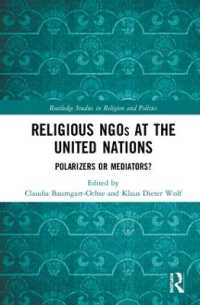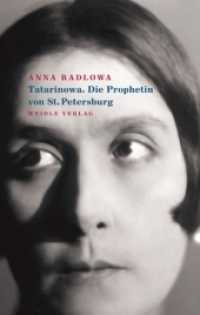- ホーム
- > 洋書
- > 英文書
- > Philosophy
Full Description
This book describes the doctrine and impact of Alexander of Aphrodisias, the second-century commentator on Aristotle, through the centuries and up to his sixteenth-century role as the clandestine prompter of a new philosophy of nature. In the millennium after his death, Alexander first served the Neo-Platonic schools as their authority on Aristotle, and in the Arabic centuries subsequently served as Averroes' exemplary exponent of the doctrine of the mortality of the soul. For this reason, the Latin Scholastics deemed his work unworthy of being translated. This changed only in the late Middle Ages, when Alexander emerged as the only Aristotelian alternative to Averroes. When in 1495 his account of Aristotle's psychology was translated and published, his principles of a natural philosophy, which were exempt from metaphysics and based on sense perception, eventually became accessible. The prompt reception and widespread endorsement of Alexander's teaching testify to his impact throughout the sixteenth century.
Originally published as Volume XVI, No. 1 (2011) of Brill's journal Early Science and Medicine.
Contents
1. Alexander of Aphrodisias in the History of Ancient Philosophy
1.1. Alexander, the 'Exegete' of Aristotle 3
1.2. Alexander's Extant and Lost Writings 5
1.3. Alexander's Position in the Neoplatonic School 8
2. The Reception of Alexander from the End of the Fifth to the End of the Fifteenth Century
2.1. Alexander among the Arabs: Averroes and the Predominance of the Doctrine of the Soul 10
2.2. Alexander in Scholasticism: Immortality and Theory of Cognition—Buridan and Argyropulus 18
3. The Transition at the Turn from the Fifteenth to the Sixteenth Century
3.1. Girolamo Donato and his Translation of the "Enarratio de anima ex Aristotelis institutione" 25
3.2. The Use of Donato's Translation by Nicoletto Vernia 30
3.3. Philology and Philosophy: Two Modes of Reception of Donato's Alexander in Agostino Nifo 36
3.4. Nifo's 'Saving' of Alexander 43
4. Alexander in the Sixteenth Century
4.1. Alexander and the Problem of Immortality: Cardano, Zabarella 49
4.2. From Alexander's Doctrine of the Soul to the New Philosophy of Nature: Pietro Pomponazzi 58
4.3. Manifestations of Natural Philosophy in the Tradition of Alexander in the Sixteenth Century:
Porzio, Fracastoro, Cardano 67
4.4. Bernardino Telesio: the Krypto-Alexandrist as 'First of the Moderns' 74
5. Bibliography
5.1. Sources 82
5.1.1. Alexander of Aphrodisias 82
5.1.2. Other Sources 84
5.2. Secondary Literature 86








